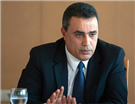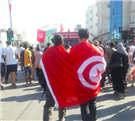In the intricate network of bilateral and regional relations involving countries in the Middle East and the Maghreb, and in the cross-diatribes between Saudi Arabia, Qatar, Egypt, and other non-state actors, Tunisia is slowly trying to diversify its foreign policy vectors. As Prime Minister Mehdi Jomaa is conducting its first visit to Paris, it appears that the previous visit to Washington had been even more important. Jomaa’s visit to the United States between 2 and 4 April is an example of how the current transitional government is trying to promote Tunis outside the region. At the same time, the visit highlights Tunisia’s current priority: fundraising in order to help the country come out of its current socio-economic crisis.
Beyond the political divisions and the rift between Islamists and seculars (not only between Ennahda and the secular parties, but even at the social level) that emerged after the fall of Ben Ali, the real challenge to the Tunisian transition seems to be economic. Despite the political change in the past three years, the situation has worsened in the country and could be even worse in 2015: the unemployment rate continues to rise and the unemployment rate for young people is among the highest in the region. (Tunisia’s youth unemployment rate is more than forty percent, while the regional average is about twenty-eight percent.) For the first time, economic growth has fallen below three percent and investments struggle to find venues. Just two weeks ago some rumors in the local press suggested that by April the government might no longer be able to provide salaries and pensions for civil servants. If true, this would be an event that has not occurred since 1956, the year Tunisia gained independence from France. This means that, albeit intermittently and latently, the country lives in a constant climate of popular mobilization, potentially harmful for stability in this delicate phase. The imbalance between the coastal regions and the central ones continues to have an impact on Tunisia. In this context, the main concern for the Tunisian government is to secure new foreign aid, as the country’s economy needs more capital in order to recover at least in the short term.
It is exactly for this reason that Jomaa meticulously chose the destinations of his first official visits. This was unsurprisingly colored by his experiences in the business world: for years, he has worked at Hutchinson Manufacturing (at Hutchinson Aerospace), was a member of Total group, among other business ventures), and is a former Minister of Industry. Before going to Washington, the first foreign trip of the Tunisian Prime Minister had been a tour of the Gulf in mid-March. Jomaa visited Saudi Arabia, Qatar, the United Arab Emirates, Kuwait, and Bahrain with the aim of attracting investment. This was done despite the tension arising from Saudi Arabia’s ban on the Muslim Brotherhood—close to Ennahda, given that it emerged as a Tunisian branch of the Brotherhood—a ban that, in turn, led to the diplomatic crisis between Riyadh and Doha, Qatar being a supporter of the Muslim Brotherhood. For Tunisia, this has a drastic reduction in funds from Riyadh in the last few months, as Saudi aid was being increasingly allocated toward funding Egyptian generals. What Tunisia can expect to receive from the Gulf monarchies in terms of money, then, is essentially foreign direct investments. Nevertheless, in the wake of the Saudi veto against the Muslim Brotherhood, Ennahda’s powerful position in Tunisia provoked the delay of investment projects in infrastructure from the United Arab Emirates, Bahrain, and Saudi Arabia. This is one of the reasons why, on the one hand, Doha continues to fund Tunis (so far, with about two billion dollars).
These changes in the fabric of Tunisian foreign relations preceded the official Washington visit from 2 to 4 April, during which President Obama announced that the United States would grant a 500 million dollar secured loan to Tunisia, in addition to the 485 million dollar loan in 2012. Therefore, pragmatism seems to guide Jomaa’s government’s foreign policy and, in particular, is strictly tied to economic and financial policy. The need to get secured loans and aid from other international actors in order to support the country’s difficult transition is the compass that guides the official visits of the Prime Minister of Tunisia abroad. In this sense, Tunisia is achieving moderate success, as Tunis is obtaining loans and aid. Obviously, the fact that Tunis is being able to obtain loans and foreign aid is not per se a success, especially if the fund received will fail to reach the goal of a more equal redistribution (a goal that, if not clearly delineated by the government, is at least the one expected by Tunisian people). Nevertheless, on the other side it seems that this kind of capital is quite necessary in order to recover the economy at least in the short run. Moreover, the fact that Tunis has been successful in getting aid from international organizations like the International Monetary Fund and the World Bank denotes a credibility that other transition government may not yet have reached. Indeed, in Washington Jomaa also met with World Bank President Jim Yong Kim, who has warranted 1.2 billion dollars to support the country in 2014, and the Director of the IMF Christine Lagarde, who has given the green light for the fourth tranche of loans (225 million out of a total of 1.7 billion dollars).
Thus, the US tour aimed, almost exclusively, to raise the funds needed to boost the national economy and to give greater scope to the democratization process and political stabilization—pending parliamentary and presidential elections that should be held by 2014. In fact, the outcome and the possible success of the democratic transition are strictly tied to Tunisia’s economic performance. Economic problems represent the major reasons behind the 2011 revolts and they should directly influence the political and institutional path. It is in this sense that economy, security, and politics are connected. So far, even with his business background, Jomaa has been unable implement measures that would aid in the recovery of the economy. The budget deficit amounts to almost 2.5 million dollars, due to Ennahda’s policy of public spending within the past two years. In order to ensure its popularity, the Islamist party-led government has dramatically raised public spending through the increase in public wages and food and energy subsidies. It has also employed hundreds of new civil servants, whose salaries represent almost forty percent of the total Tunisian GDP. What Jomaa can now do is to boost the economy and try to bring about stability and democratization through finding new sources of aid. This is not to say that aid alone will help Tunisia to come out from the current crisis, as the country will need more structural reforms, but it could push the economy in the short term. Jomaa declared that, thanks to new loans, the Tunisian government will be able to cover all public salaries and retirement funds and will safeguard at least some form of subsidies in the medium term.
What about the long run? In this grain, security, politics, and even relationships with external actors like the United States become crucial. Security concerns related to political violence and attacks for which various jihadists groups have claimed responsibility are one of the top priorities for the Tunisian government, given that they have a direct impact on tourism, which alone represents twenty percent of the Tunisian GDP and investments.
Nevertheless, the question is: will all this be sufficient? Surely the fact that Tunisia could be perceived as a believable interlocutor by the most important international financial institutions, by the United States and by its most important economic partner – France – is a positive sign for the Tunisian government’s external action. However, it is equally true that the country will still have to overcome numerous and insidious challenges before it can be declared a success in the democratization process. As often happens, political revolutions need new resources to be invested in the project of a “new” country, but at the same time it is essential that all those involved contribute in achieving the same goal and socio-political divisions are avoided. Thus, the climate of division that has arisen in Tunisia over the last three years seems to constitute a partial stop to the democratization path. On the other hand, one positive factor is the active role and influence of civil society and the middle class. This involvement has been so deep to the point that the current government itself is the result of lengthy negotiations led by the largest labor union in the country (the UGTT), the Union of Industrialists, Traders and Craftsmen (UTICA), the Tunisian League for Human Rights and the Bar Association. If Tunisian politics will be able to fully reap the fruits of this social dynamism – and the approval of the new Constitution it is already an example – the path towards democratization could be less daunting. At that point, the support of international actors – state and non-state actors – and the policy of diversification of relations in the light of new loans and financial aid can be best utilized to provide a more solid basis for the project of democratization in Tunisia.
Obviously, there are also political motivations behind Jomaa’s visit to Washington. First of all, there is the security issue: Tunisia is experiencing a new phase of instability due to the emergence of salafi-jihadi groups and individuals both from Algeria and within Tunisia itself. The United States have restated their help to Tunis against terrorism and, broadly speaking, are searching for new models for democratization to support. It is on these considerations that the new and original axis between the United States and Tunisia (the two countries have launched a “strategic partnership”) are pinned. This is an axis that is useful to Obama’s interest of finding a new country of reference for the arduous Arab transitions.
Tunisia can definitely be a transition model for other Arab countries (not just those affected by the riots of 2011). That said, next to some positive aspects, there are other factors to be considered that make the situation in Tunisia still very delicate. The country is a perfect example of how security, political, economic, and social issues are intertwined and establish a single framework. If the macro-economic structural problems are not resolved, then the very underlying causes of the uprisings have not yet been removed and, in the long run, this could constitute new elements of instability. At the same time, without a stable country safe from reactionary forces, the economy itself is unlikely to recover. This is because the economy depends heavily on tourism and foreign investment, for which a stable political situation is a precondition. Finally, the political choices will weigh on economy and security. Thus, the elections that should be held by 2014 will be a crucial step for the fate of the country. Despite the difficulties, the Jomaa government seems to have understood the importance of looking abroad to get the support needed in order to keep up the transition process. However, the real structural reforms will have to come from a political government, which will also benefit the financial support obtained from the existing institutions.
![[Tunisian Prime Minister Mehdi Jomaa met with US President Barack Obama in April 2014. Photo courtesy of VoaNews.]](https://kms.jadaliyya.com/Images/357x383xo/jomaadc.jpg)





